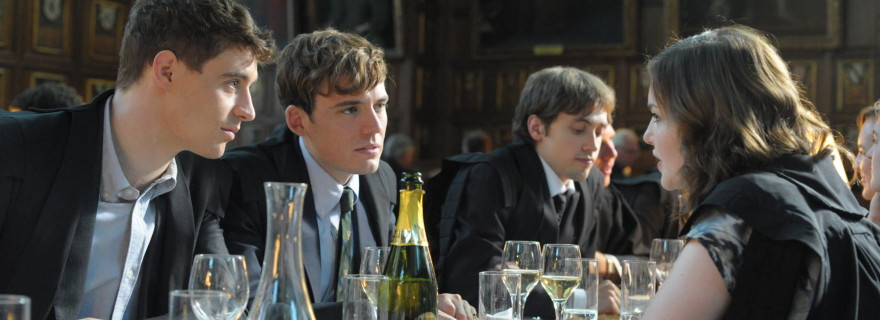'The Riot Club'
Movie Rating:
2
So, here’s the thing with Britain: The class structure is out of control! Rich toffs rule the country, while the lower classes are stuck in a rut they’ll never emerge from. The divide runs so deep that the accents for the high and low people of England are different and there’s nothing anyone can do about it! Here’s the thing, though: You don’t even need to live in England or have more than a passing knowledge of the country to know all that. Yet now we have a movie called ‘The Riot Club’ that presents these facts as revelations and then keeps shoving those inconvenient truths down viewers’ throats until they beg for mercy.
‘The Riot Club’ is not a horribly made or acted movie, just one with such an obvious message pushed so hard and with such self-importance that the film is almost as irritating as the upper class dinks who populate it.
Max Irons (‘The Host’) stars as Miles, a young and privileged Oxford student with a heart of gold who, along with the more obviously snooty Alistair (Sam Claflin from ‘The Hunger Games’) has been invited to join an elite school group known as The Riot Club. It’s a longstanding institution comprised of the future leaders of the country who meet up for debaucherous dinners where they dress to the nines, celebrate how rich they are, and engage in all the filthy behavior that they’ll have to give up once they rule the country. The snobby twats who populate the club are just as awful as you’d expect and, even though they’re played by some talented young actors like Freddie Fox and Douglas Booth, they’re virtually indistinguishable. Maybe that’s part of the film’s acidic message or maybe not. It’s hard to say since the movie is a bit of a mess.
The important thing is that Miles is actually a kindly young soul sensitive to class warfare. Much to the disgust of his fellow Rioters, he’s actually dating a thoroughly delightful girl (Holliday Grainger) who would be absolutely perfect if she weren’t from a lower class family. Obviously, for the sake of audience sympathy and Miles’ empathetically conflicted motivations, that makes her even more perfect. But for the competitive Alistair and the veteran Riot Clubbers, she’s a wedge between them. This divide builds up toward a stupidly expensive dinner where the boys get nasty, and ends in some inevitably shocking behavior. We know it’s shocking not just because it’s unexpectedly violent, but because the stern music and lingering cameras let us know in no uncertain terms that it’s time to be shocked.
The film is based on the play ‘Posh’ and adapted to the screen by original playwright Laura Wade. ‘Posh’ was a controversial hit, released shortly after the publication of a photo of some prominent English leaders in a similarly smarmy Oxford club, and thus feels quite relevant. I won’t pretend to have seen or read that play, but I will assume that since Wade adapted her own work, this screenplay is probably similar. Certainly, it feels like a particular type of heavily symbolic, metaphoric and aggressive playwriting that works on the stage, a medium that suits distancing stylization, but falls flat on film because every character feels so convolutedly calculated.
When movies are driven by dialogue and realism, the characters had better feel real and not like arguments in an essay. Unfortunately, ‘The Riot Club’ never feels close to real, and its social commentary is so on-the-nose and repetitive that the movie quickly becomes very annoying. It’s not as if the hopelessness of the class system and the ways in which the upper class in England are never punished are themes that shouldn’t be explored. It’s just that when any overtly political theme is trotted out on film, it has to be done with a more delicate or at least more cinematic touch than the 107 minutes of whiny ranting that comprise ‘The Riot Club’.
Perhaps the most frustrating aspect of this deeply frustrating film is the fact that it’s not a total failure. The cast is quite good (especially Tom Hollander in a slithering “Ghost of Christmas Future” style cameo). At times, they’ll trick you into thinking that you’re watching actual humans for a second before the didactic writing slaps them to the ground. Likewise, the central debauchery is an undeniably pointed metaphor to hinge a movie around. Danish director Lone Scherfig (‘An Education’, ‘Wilbur Wants to Kill Himself’) hits a few nasty high notes that suggest the powerful movie everyone involved thought they were making. You can see that with more complex characters, a less simplistic good/evil split in class dynamics, and a willingness to push shock value even further, there was a harsh little movie at the core of ‘The Riot Club’. It really could have been something interesting, but unfortunately everyone pushed their political buttons a little too hard and dialed back the visceral potential of the movie a little too much for the good version to emerge.
The overcooked message movie that we’re left with doesn’t quite work, and that’s all the more disappointing because it has some decent performances, ideas and moments that actually deserved a better movie worthy of them.



